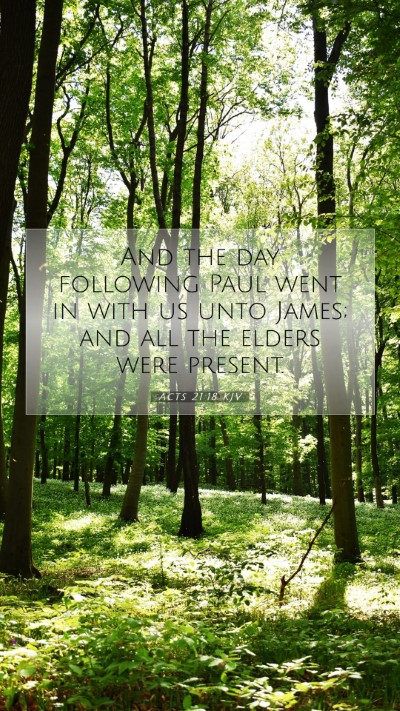Understanding Acts 21:18
Acts 21:18 is a pivotal verse in the New Testament that illustrates the Apostle Paul's journey and his interactions with the early church. This scripture provides significant insights into the dynamics of the Christian community during the time of Paul and highlights his commitment to the mission entrusted to him by God.
Bible Verse Text
“And the day following Paul went in with us unto James; and all the elders were present.”
Bible Verse Commentary
The commentary on Acts 21:18 by notable biblical scholars reveals various layers of meaning. Below are combined insights from Matthew Henry, Albert Barnes, and Adam Clarke.
Matthew Henry's Commentary
Matthew Henry highlights the importance of Paul's visit to Jerusalem. He emphasizes that Paul was intent on fulfilling his responsibility to the church. By visiting James, the leader of the early Christian congregation in Jerusalem, Paul demonstrates his respect for the established authority and his desire for unity within the church. This act signifies a crucial point in the early church's history, addressing the challenges of reconciling Jewish traditions with the new covenant in Christ.
Albert Barnes' Notes
Albert Barnes provides an analysis focusing on the characters of James and the elders who were present. He remarks on the significance of this gathering as an example of church governance and communal decision-making. Barnes notes that this meeting was a vital step for Paul as it allowed him to report on his missionary endeavors and to seek guidance on addressing recent controversies within the church, particularly regarding Gentile believers and the law.
Adam Clarke's Commentary
In Adam Clarke's examination, he discusses the geographical and cultural context of the verse. He explains that Paul's coming to James and the elders represents not only a meeting of leadership but also a moment of reconciliation. Clarke points out that this encounter foreshadows the debates that would later arise regarding faith and works, as well as the inclusion of Gentiles in the faith without the burdens of the Jewish law. This context is essential for understanding the historical challenges faced by early Christians.
Summary of Ideas
The verse encapsulates several key themes:
- Leadership and Unity: Paul's interaction with church leaders demonstrates the importance of unity within the Christian community.
- Community Responsibility: The gathering allowed Paul to share his experiences, reinforcing the sense of shared mission among believers.
- Cultural Reconciliation: The convergence of Jewish and Gentile believers is a central narrative in Acts, illustrating early church dynamics.
Cross References
Acts 21:18 can be further understood in conjunction with the following verses:
- Galatians 2:9: Discusses the acknowledgment of Paul’s ministry among the Gentiles.
- Acts 15:2: Details the council at Jerusalem which addresses the same thematic concerns regarding Gentile inclusion.
- James 1:1: Identifies the author of the epistle, tying back to the consistent leadership acknowledged in Acts 21.
Conclusion
Acts 21:18 serves as a significant illustration of the early church's efforts to maintain unity and address diverse cultural challenges within Christianity. Understanding this verse within its context allows for a richer appreciation of the scripture and its implications for current church dynamics. Whether you are participating in bible study groups, utilizing bible study tools, or searching for deeper bible verse meanings, this passage provides valuable insights into the foundational principles of Christian fellowship and governance.


